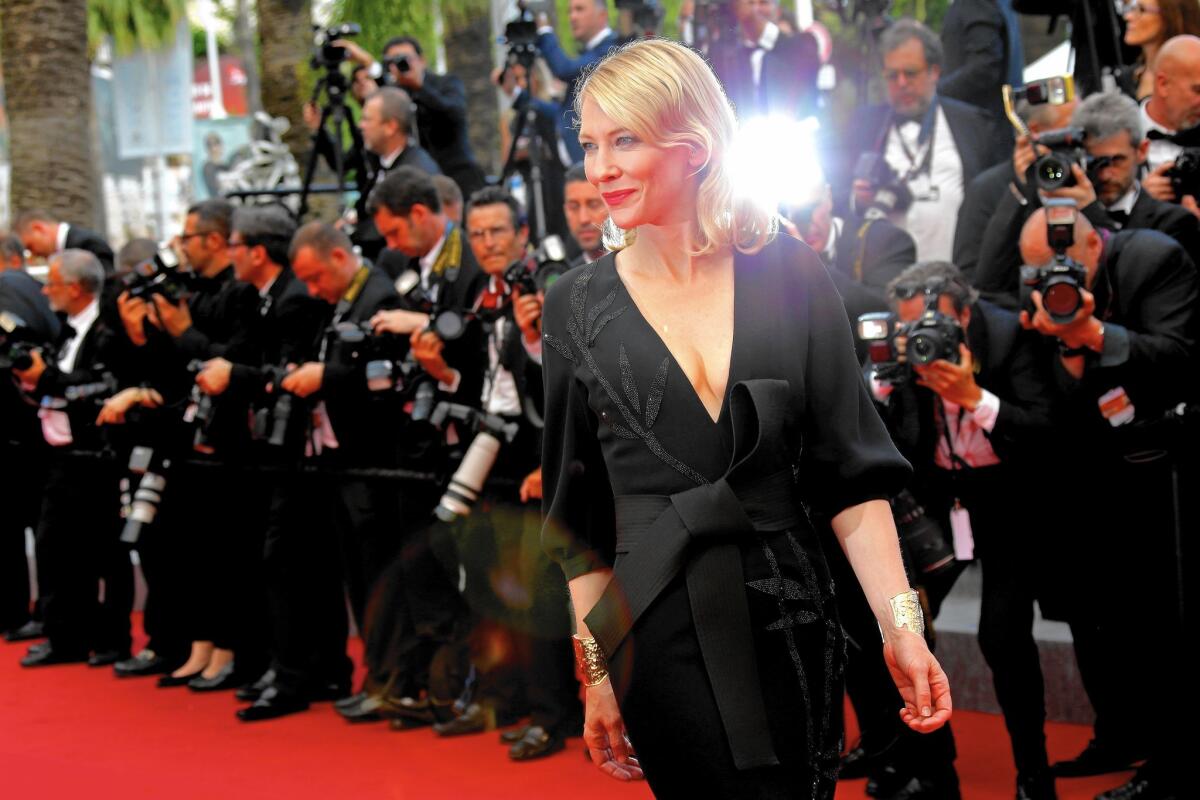Digital upstarts upend tradition at Cannes Film Festival

Cate Blanchett attends a screening at Cannes.
The market at the Cannes Film Festival, where international movie rights are bought and sold, has long been a bastion of the old-school film industry. Theatrical viewing is central. The same deal makers have been attending for decades. Signs of the digital age are generally hard to come by.
But at this year’s festival, cracks are beginning to appear. One of the entertainment world’s most traditionalist gatherings is letting in the 21st century — slowly.
In a period when a number of Silicon Valley firms have taken the plunge into film, their presence is being felt at this annual springtime event, the most prominent event on the global cinema calendar and often the most set in its ways.
Presentations by companies such as Netflix and virtual-reality outfit Oculus have been priorities for attendees. Agents who once never gave a second thought to nontraditional platforms are now courting them. Beefed-up teams from digital entities such as Amazon and Vimeo are pursuing rights with the zeal once reserved for studios like Universal Studios and Warner Bros.
On Tuesday, Netflix sent a signal about its growing clout when it acquired the Kevin James’ movie “The True Memoirs of an International Assassin,” its first major original-film buy at Cannes.
The result is a vibrant if combustible time for the worldwide film business and the Cannes market that represents it, which in recent months has begun to catch up to the changes of its TV counterparts. But as much as people want progress, they remain cautious about the ways these efforts could upend the business.
“The conversations I’ve had here have been all over the map,” said Jeremy Boxer, the creative director for film and television at Vimeo. “A lot of people are excited, and many are worried. But there’s an awareness that the revenue they could depend on even three or four years ago they can no longer depend on. And that is prompting change.”
The talk has been catalyzed by Netflix. The streaming giant has dived into original films during the past eight months, paying a reported $12 million for rights to distribute “Beasts of No Nation,” an African war drama from “True Detective” director Cary Fukunaga. But although Netflix has opened the vaults for filmmakers, it also has polarized the industry with a model that controls all rights — moving away from ancillary revenue streams such as DVD and also eschewing a theater-first release.
Netflix Chief Content Officer Ted Sarandos stirred strong reactions when he spoke Friday at an official Cannes event.
When French moderators and attendees pressed him on questions about his non-theatrical model — the European film community has been slower to embrace digital shifts — he said: “Nothing we’re doing is meant to be anti-theater or anti-cinema,” adding, “People will still go to movies. But I think people want choice, and if you don’t give them choice it will only harm” studios’ interests.
Contrary to perceptions, Cannes is far from just a place of high-end directors and cinephiles. Sales agents and buyers this month pour into this coastal French town to do business at what’s informally known as the market. The market serves as a bazaar of international rights for a wide range of movies that are not screening as part of the official festival selection, functioning as a sort of trade show distinct from the upscale proceedings going on nearby.
With nearly every important global buyer and seller present, attendees gather on a dedicated convention show floor as well as the town’s many hotel bars and restaurants to hash out deals for territorial rights. It is one-stop shopping, a place where a producer in Asia can seal a deal with a buyer from Eastern Europe, and where star appearances and footage samples are often brought out to sweeten the pitch.
This year, for example, The Weinstein Company paid a reported $6 million for rights to “Three Generations,” a teen transgender story starring Elle Fanning, off just ten minutes of footage.
Digital companies have been participating more heavily in these activities this year, as evidenced by Netflix’s James buy. But Sarandos’ keynote had an even tonier feel, taking place in the festival’s elegant Bunuel Theater.
The event even featured opening remarks from Cannes festival director Thierry Fremaux, a sign tech firms had infiltrated the ranks of the official, prestigious festival. Fremaux, too, questioned Netflix’s model. “Ask him,” Fremaux told he audience before the talk, “whether he wants to support the production of film for theaters.”
Amazon has also been gathering steam on the international film scene. The company, best known in television for its Golden Globe-decorated “Transparent,” several months ago hired the veteran film producer Ted Hope to run its operations. Last month it announced that it would back Spike Lee’s new drama “Chiraq.”
The company has employed a less radical model, incorporating theatrical exclusivity into its plans, and also offering both subscription and one-off viewing options to consumers.
Vimeo has tried another approach. The company that began primarily as an online industry screening service has come to the festival looking to buy movies for online-only viewing. It marks a switch from a time not long ago when films would move straight from theaters to DVD.
Riding high on the breakout success of its episodic pot comedy “High Maintenance,” Boxer and another colleague are also in Cannes seeking original content. Though Vimeo’s reach is shallower than Amazon or Netflix, it hopes to entice filmmakers with a more favorable revenue split.
Even without making a buy, sales agents say companies like Netflix have exerted influence on the market. Producers are sometimes less likely to agree to a traditional studio deal if they think a big payday from a digital player is looming.
Film industry insiders say that they need to rethink the traditional ways of doing business, in which producers sell movies primarily to theatrical distributors, who often hold or then sell DVD and television rights.
“These are all new buyers, and woe unto us if we don’t take them seriously,” said veteran sales agent John Sloss of Cinetic Media.
But Sloss said the digital companies’ models are far from entrenched.
“What’s fascinating about this period is that the portals are feeling their own way about what works for them, even as filmmakers and financiers need to figure out what works on their end,” he said.
For directors accustomed to a more conventional world, this can be a shock and presents a challenge.
“All filmmakers want the undivided attention of theaters. They don’t want people to text or turn off the movie; they want the communal experience,” said Asif Kapadia, the director of the acclaimed documentary “Senna.” His latest selection, “Amy,” about the late soul singer Amy Winehouse, premiered to warm reviews in the Cannes official selection Saturday.
“But the other side is that you want as many people as possible to see the work,” Kapadia said. “In the old days, if you didn’t have a distributor you were confident in, no one would see the movie, and that was years of your life wasted. In the digital world that’s not the case.”
Digital issues even came to a head at Cannes during a meeting between Woody Allen and reporters at the festival several days ago.
Allen embodies the old school — he has premiered many new movies at Cannes,” including “Midnight in Paris” in 2011 and the new existential comedy “Irrational Man” this year. But Allen has also signed up to do an Amazon series. It does not seem to be taking as well.
“It was a catastrophic mistake,” he said of his Amazon commitment. “I’m struggling with it. I hope I don’t disappoint Amazon. I don’t know what I’m doing. I’m floundering. I expect this to be a cosmic embarrassment.”
New platforms may only be the start, however.
Oculus, which is working to build a new medium with virtual reality, will fly in top executives to address attendees Wednesday and try to woo support from the traditional filmmaking community.
In a screening of a Cannes competition title, Joachim Trier’s “Louder Than Bombs,” virtual-reality equipment made a surprise appearance. A character played by Jesse Eisenberg donned a headset and was schooled in how to use it, offering a rare burst of cutting-edge technology in the more staid realm of a Cannes red-carpet screening.
Those involved in the changes say that these technologies offer a further hint of the future.
“I feel like it’s come really far in a year,” Sloss said. “But it feels like it will come even further next year, with new companies, new models, new experiments. I don’t see this plateauing anytime soon.”
More to Read
From the Oscars to the Emmys.
Get the Envelope newsletter for exclusive awards season coverage, behind-the-scenes stories from the Envelope podcast and columnist Glenn Whipp’s must-read analysis.
You may occasionally receive promotional content from the Los Angeles Times.







